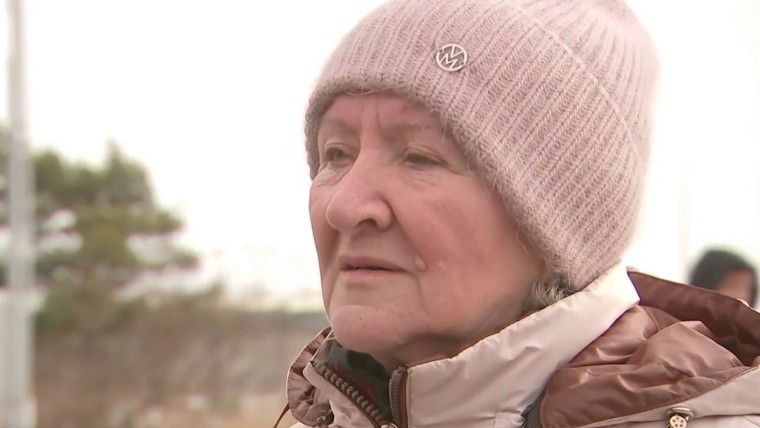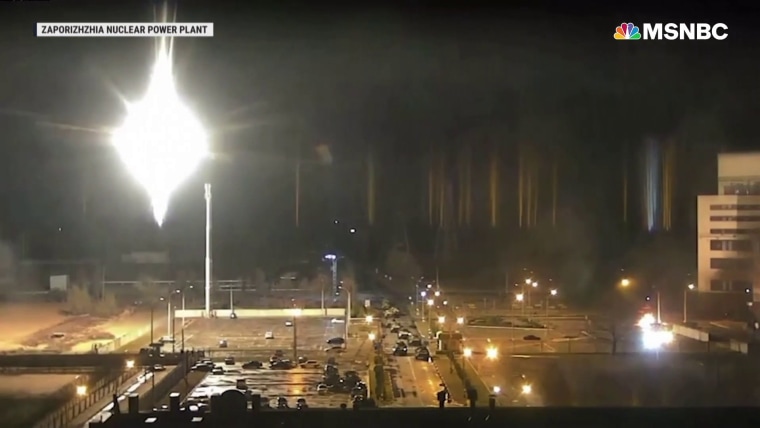As Putin rewrites history, Ukraine’s nuclear power plant is on fire
I cry when I see the heartbreaking scenes of people in Kyiv hiding on subways from Russian President Vladimir Putin’s brutal attack. A burned at Europe’s largest nuclear power plant on Friday, as officials warned of a catastrophic hazard. But Moscow’s rockets raining down on the Ukrainian capital are a grim historical joke: the Russians are ravaging the city that my great-grandfather, Soviet leader Nikita Khrushchev, lovingly rebuilt after the devastating Nazi occupation of World War II.
The Russians are ravaging the city that my great-grandfather, Soviet leader Nikita Khrushchev, lovingly rebuilt.
Military analysts are now talking about it the siege of Kiev by the Russian army. This is perverted – Putin knows very well the horrors generated by these military tactics. He comes from St. Petersburg, which suffered like Leningrad the gruesome Nazi siege that lasted nearly 900 days. Around 1.5 million Russians died there, and the Soviet Union lost more than 20 million people fighting Adolf Hitler. Although Russia was a defender of Europe In that catastrophe, Putin has now transformed his nation into one of the continent’s most ruthless threats.
The selective interpretation of the Russian President’s past reveals his historical obsessions. He wrote an extensive paper last summer about why Ukrainians are essentially Russians – Recreation of a popular historical tale of many Russian rulers, both Tsars and Soviets. He explained why Ukraine – translated as “Rim (of Russia)” and Malorossiya or “Little Russia” – belongs to Moscow.
Relations between Moscow and Kyiv have traditionally been marked by severe tension and hostilities. Ukrainian hostility towards Russia existed well before 2014, when Putin annexed Crimea from Ukraine and provided military and other support to breakaway Donetsk and Luhansk regions.
History shows that Ukrainians have tried to escape the control of a larger, dominant Russia over the centuries. They aspired fiercely to break free from Russian supremacy – and even argued with it the founding of Kievalmost 400 years In front Moscow, give them the upper hand. You can see elements of it since the 880s, at the time of Kievan Rus’, a proto-Slavic state for Russians and Ukrainians. Consider that The Ukrainian poet Taras Shevchenko became a national hero in the 19th century when he glorified his people’s burning desire for freedom.
Positioned between West and East, early Kyiv retained a measure of independence among the princely Russian family of Ruriks through the 1300s. In the 17th century, what was then known as the Zaporizhian Sich, a semi-autonomous Cossack warrior state, entered into a sort of “association agreement” with the Russian Empire.
This lasted until Tsarina Catherine the Great Decided she was fed up with the Zaporizhian Cossacks’ stubborn disobedience and proud independence. In 1775 she ordered the liquidation of the Sich and officially declared the region a part of the Sich Novorossiya (territories in western Russia). It is this Novorossiya that Putin wants to recreate today – after Catherine’s legacy.
Since the 18th century, Moscow has treated Ukraine as a virtual colony, ceding its raw materials and grain to the central power. However, the area, once is considered the granary of the Soviet Union, was still able to preserve its own language and culture. These traditions continued from the tsarist regimes to the communists.
But under Soviet leader Joseph Stalin in the early 1930s, the oppression of Ukraine reached astounding proportions. To enforce agricultural collectivization, Stalin decreed that Ukraine had to cede all private lands and crops to the state. He wanted to ensure that Soviet workers would be fed with all hands during his industrialization efforts.
The result was the Holodomor – the Great Famine of the early 1930s – what claims many millions of lives. This fatal failure made the Ukrainians even more suspicious of the Russians.
Before the end of that decade, however, Stalin sent Khrushchev to Kyiv to help revitalize Ukrainian agriculture. My great-grandfather felt very connected to the region. He had worked there as a miner in the Donbass in the 1910s and often wore the brightly embroidered Ukrainian folk shirts. His wife, my great-grandmother Nina, was ethnic West Ukrainian and proud of it.
It has always been the Kremlin’s goal to curb Ukrainian national pride. Khrushchev was supposed to ensure that nationalism and anti-Soviet sentiment were kept in check when the economy was being rebuilt. In 1939 he oversaw the difficult and brutal takeover of western Ukraine from Poland.
A document from that time, which I found in my family’s home, quotes my great-grandfather as saying: “If we hang a few militant oppositionists in Lviv’s main square, others will be less tempted to rebel.” And this is from one Man who really liked Ukraine and helped her rise from the ashes after the war.
Svetlana Alexievich, Nobel laureate in literature and half-Ukrainian, has often told me stories about the region’s intense hostility towards Russians. She focused on it, she recently explained, “not only on your great-grandfather, but also on his successors with Ukrainian connections. Leonid Brezhnev and Mikhail Gorbachev always put the middle first. We were annoyed by their domineering attitude towards power.”
Today, this feeling of superiority over the Ukrainians seems to be rooted in the Russians.
In Russian, Ukrainians are colloquially and often disparagingly referred to as “Chokhol.” This term dates from the Zaporizhian Sich period and roughly translates to “tuft” – believed to be a long side curl on a Cossack’s shaved head. The Ukrainians, in turn, call the Russians “moskal” – a derogatory term that applies to the entire population of Russia, not just the people of Moscow.
Growing up, I often spent summers in Kyiv visiting relatives there. I remember being taunted for my perceived Moscow “superiority” – although I don’t think I showed any. The fact that I was Russian was enough.
Today, this feeling of superiority over the Ukrainians seems to be rooted in the Russians. Putin stiffly orders a Ukrainian “special operation” (his euphemism for war) to be launched while sitting alone at one end of a large white table. His entourage agrees from afar, gathered across the table in a vast hall in the Kremlin. It looks too much like Stalin’s times.
Meanwhile, Ukrainian President Volodymyr Zelenskyy, the former comedian, unshaven in his military drab, is out with his team on the streets of Kyiv. He more than fulfilled the moment while shepherding his nation amid the deadly onslaught of his neighbor-turned-nemesis.
The images of these two men – like the images of Russian tanks on the streets of Ukraine and of charred and destroyed buildings in their cities – suggest that the millennium of Russia’s sphere of influence over Ukraine has come to a tragic end.
Even if Putin succeeds in his imperial quest, Kievan Rus’ is lost to Russia forever. The Ukrainians can never forgive us for this barbarism.
https://www.nbcnews.com/think/opinion/ukraine-nuclear-power-plant-burns-putin-rewrites-history-ncna1290827 As Putin rewrites history, Ukraine’s nuclear power plant is on fire

